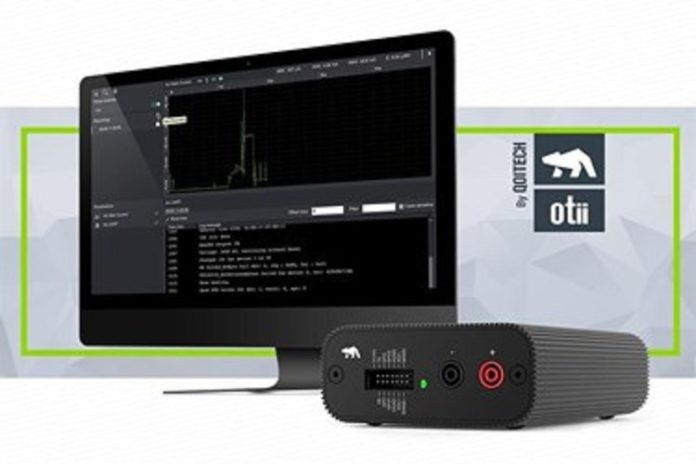Ericsson, Sony Mobile, Qoitech and Altair Semiconductor deliver over five times longer battery lifetime to a connected wearable prototype for diabetes monitoring.
Extending the battery life of modern wearable Internet of Things (IoT) devices is essential for better user experience and reliability. Qoitech AB’s Massive IoT solution for e-health is a great example of how low-cost and power-efficient connectivity can enable mass adoption of Massive IoT and pave the way for a range of industrial and consumer IoT applications.
Qoitech AB recently announced that its Otii solution developed in collaboration with Ericsson, Sony Mobile and Altair Semiconductor delivers over five times longer battery lifetime in a second generation connected wearable prototype for e-health such as diabetes monitoring.
Connected e-health wearable shows 5X battery life improvement
The improved power efficiency relative to the first-generation prototype is attributed to two main factors: firstly, the integration of Altair’s ALT1250 dual-mode Cat-M1/NB-IoT ultra-small, ultra-low power chipset into the small form factor wearable device from Sony Mobile.
Secondly, the use of LwM2M protocol further reduces average power consumption. LwM2M is a device management protocol designed for managing lightweight and low power devices.
LwM2M builds on an efficient secure application layer standard called the Constrained Application Protocol (CoAP).
The demo shows that CoAP is superior to MQTT (Message Queuing Telemetry Transport) by allowing at least 20 percent better power performance (depending on the communicated amount of data) and thus increasing battery life in low-power devices.
According to the announcement, the demonstration concept uses Sony Mobile’s cloud-based service and is integrated with Ericsson’s IoT accelerator using LwM2M to simplify client-server communication and management for devices and sensor data, resulting in streamlined service enablement and application management that allows for zero-touch massive roll-out of IoT-devices and sensors.
Marie Hogan, Head of Broadband and IoT RAN, Ericsson, said: “A large, global ecosystem of partners is key to cater for different customer needs in IoT. Furthermore, end-to-end capabilities based on standardized solutions are crucial to enable scalable, competitive and efficient IoT services. This second-generation e-health demo with significantly improved power efficiency enabling long battery life on low-power devices is really encouraging for the IoT market. It enables mass adoption of Massive IoT and paves the way for a wide range of industrial and consumer IoT applications.”
“New e-health services based on the latest cellular IoT technologies and cloud solutions are promising for business innovation and enhanced end-customer experience”, said Johan Svenér, VP, Research & Incubation and Business Innovation Europe at Sony Mobile.
“The first generation of this e-health concept was demonstrated at MWC Barcelona in February 2018, and we since then have demonstrated an incredible increase in battery life in this second generation prototype”, said Ilan Reingold, VP of Business Development and Marketing for Altair. “Designing ultra-low-power devices will enable new IoT use cases, and allow vendors to reduce device cost while improving the value to end-customers.”
“We are delighted to be a part of such a worthy demonstration platform with such partners,” said Vanja Samuelsson, Founder of Qoitech. “This concept showcases the importance of addressing energy optimization from more than one angle, especially for applications that potentially help save millions of lives. So being able to verify and assure its ultra-low power credentials is particularly rewarding to us.”
Diabetes monitoring is just one of many applications that can be showcased with the Sony Mobile cloud-based services and the wearable prototype used in this demonstration.
In combination with Altair’s dual-mode Cat-M1/NB-IoT ALT1250 chipset, which is certified by leading Tier-1 MNOs around the world, it enables diverse use cases as expected of Massive IoT. For each of these use cases, the Otii solution can be used to secure long battery life for the end user, the company said.
The Cat-M1/NB-IoT connected e-health concept platform for diabetes monitoring will be demonstrated at Ericsson booth in Los Angeles, September 12-14 2018.
For more information, click here.












